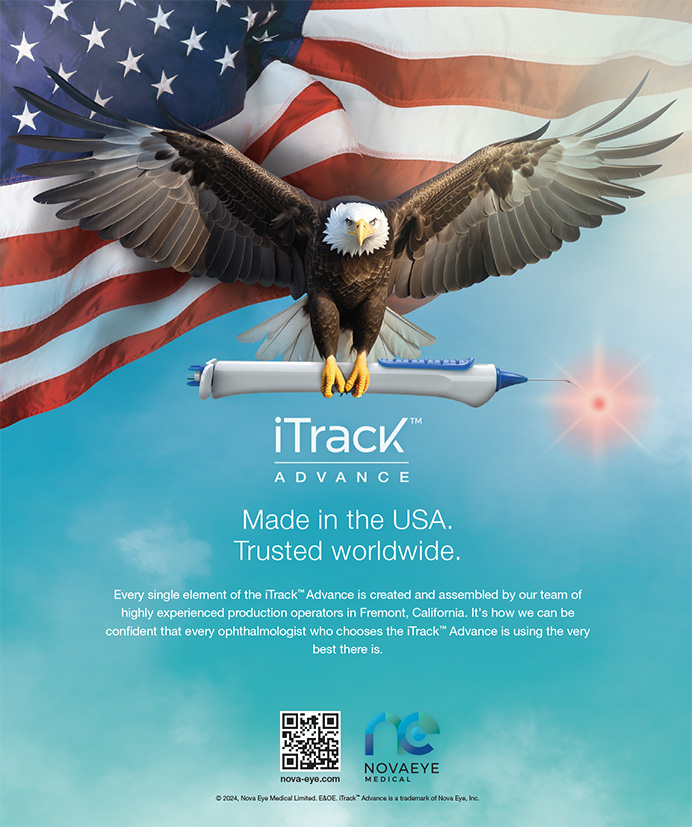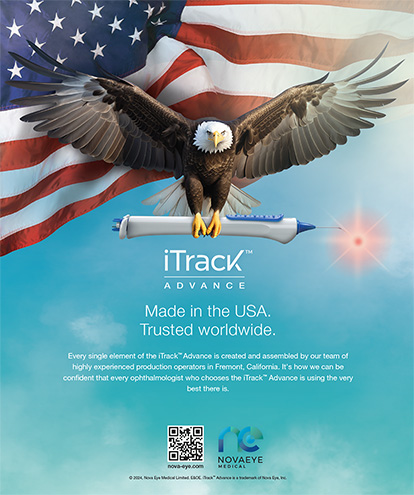
DAMIEN F. GOLDBERG, MD
For me, the top five biggest challenges were hiring staff, obtaining equipment, establishing a brand, getting involved, and finding balance.
STAFF
I would say the biggest decision when starting your own practice or even when joining an established practice is hiring the right staff. These are the people who will represent you when you are busy with patients. I have amazing staff members working with me, but some can handle pressure a bit better than others. Finding the right fit for you is crucial.
EQUIPMENT
We eye doctors love our toys! Of course, I would like to have five different topographers, but a private practice is a business. I have to be mindful to acquire equipment that makes sense for me and keeps my office current but that will not break the bank.
ESTABLISH YOUR BRAND
Right out of the gate, you may be ready to go as a surgeon, but if you are new to your community, well-known doctors will not send their surgical consultations to you. To build your brand, be polite, and use care and hard work to establish yourself. Go out in the community, and introduce yourself. In small markets, it will take only a few years to achieve this. In Los Angeles, however, I felt like it took 5 years for me to achieve enough word of mouth in the market to have referrals coming in.
GET INVOLVED
I recommend staying involved in your field through teaching, ophthalmology associations, publications, meetings, and participation on advisory boards. Running a practice is time consuming, and the work (and hours) never ends. The field of ophthalmology is constantly—and rapidly—changing. Being active in the industry to some capacity is important. Pick and choose how you would like to weave yourself into your community. For me, doing so has helped keep me on the cutting edge and has sharpened my surgical skills. In addition, I continue to enjoy the lasting friendships I have made with my medical and industry colleagues.
BALANCE
Enjoy yourself and your life! We are all of a type, which is why we are surgeons. Do not make the mistake of thinking that, if you work yourself like a dog now, you can take more time off when you get established. When you own your practice, it requires a lot of discipline to find work-life balance, because you will be offered so many opportunists. Be sure to take time for yourself. Enjoy the journey, not only the destination you hope to achieve.

CARY M. SILVERMAN, MD, MBA
This fall marks 30 years since I opened my solo practice in northern New Jersey. It was a much different environment then!
TOP FIVE CHALLENGES THEN
No. 1. Where
When opening a solo practice, I needed to find an area currently underserved by other ophthalmologists. I asked myself, how am I going to find patients? How am I going to make enough money to live?
No. 2. Insurance
Should I join the health maintenance organizations (HMOs)? At that time, most practices in my area refused to join HMOs, because they thought they could keep managed care out of the area. Joining all of the HMOs at the time allowed me to artificially establish a referral base with primary care physicians who had no choice but to refer patients to me. The end result was that I was able to jump-start my practice way ahead of schedule.
No. 3. Hospital
To which hospital should I apply for privileges, and will I get blackballed?
No. 4. Computer
Should I get a computer to perform my practice management functions from day 1, or should I use a written ledger system?
No. 5. Marketing
Should I advertise in the local paper? Do a newsletter? The head of my hospital’s ophthalmology section met me at the first department meeting. He introduced himself and said, “We don’t advertise here.” The next day, I placed an ad in the paper!
TOP FIVE CHALLENGES NOW
No. 1. Where
Is there a practice I can join that will allow me to grow within it and allow me to do surgery from day 1. Will I be paid enough and have a quick path to equity?
No. 2. Insurance
How can I provide services outside the sphere of declining reimbursement from managed care? Will I be able to provide cash procedures such as LASIK, laser cataract surgery, and premium IOLs?
No. 3. Hospital
Why should I even apply to a hospital? Can I get surgery time at the most progressive ambulatory surgery center in my area?
No. 4. Computer
Which program offers the best and an easy-to-use electronic medical record (EMR) system? Should I get an in-house server or a cloud-based system?
No. 5. Marketing
How quickly can I get my Facebook page, Twitter feed, Instagram page, YouTube account, and website up and running?

DAVID A. GOLDMAN, MD
I found the major challenges to be the business of ophthalmology, choosing the right EMR system, hiring staff, being prepared for the unexpected, and expansion decisions.
BUSINESS
We are not taught things such as obtaining occupancy licenses, establishing tax identification numbers, how to get credentialed with insurance, and managing payroll!
ELECTRONIC MEDICAL RECORDS
There is no decision here in terms of whether or not you should get one. If you are starting a practice, you have to have an EMR system. Make sure you go with a cloud-based option.
STAFF
Hire the person, not the résumé. Do face-to-face interviews, and go with your gut.
BE PREPARED FOR ANYTHING
Prepare for the unexpected. Here is one example. I have a cleaning crew come in after hours. One day, a patient had explosive diarrhea all over the bathroom in the middle of the day. These things will happen.
EXPANSION DECISIONS
Deciding when and how to expand, whether it be staff, equipment, or space, is a constant challenge!
Damien F. Goldberg, MD
• private practice, Wolstan & Goldberg Eye Associates, Torrance, California
• (310) 543-2611; goldbed@hotmail.com; Twitter @damiengoldberg1
David A. Goldman, MD
• private practice, Goldman Eye, Palm Beach Gardens, Florida
• (561) 630-7120; david@goldmaneye.com
Cary M. Silverman, MD, MBA
• medical director of EyeCare 20/20 in East Hanover, New Jersey
• csilverman@eyecare2020.com; Twitter @TheLASIKdoc


